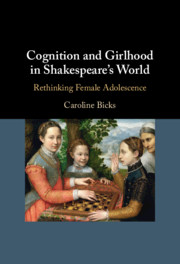Book contents
- Cognition and Girlhood in Shakespeare’s World
- Cognition and Girlhood in Shakespeare’s World
- Copyright page
- Dedication
- Contents
- Figures
- Acknowledgements
- Introduction
- Chapter 1 “A spectacle to men and angells”
- Chapter 2 “Imagination helps me”
- Chapter 3 “The progresse of an Art”
- Chapter 4 “If I should tell / My history”
- Chapter 5 “Put on the minde”
- Chapter 6 “From thirteene Yeares … resolved to serve God”
- Coda
- Notes
- Bibliography
- Index
Chapter 4 - “If I should tell / My history”
Memory, Trauma, and Testimony in Pericles and Hamlet
Published online by Cambridge University Press: 24 June 2021
- Cognition and Girlhood in Shakespeare’s World
- Cognition and Girlhood in Shakespeare’s World
- Copyright page
- Dedication
- Contents
- Figures
- Acknowledgements
- Introduction
- Chapter 1 “A spectacle to men and angells”
- Chapter 2 “Imagination helps me”
- Chapter 3 “The progresse of an Art”
- Chapter 4 “If I should tell / My history”
- Chapter 5 “Put on the minde”
- Chapter 6 “From thirteene Yeares … resolved to serve God”
- Coda
- Notes
- Bibliography
- Index
Summary
Chapter Four explores the rear-brain faculty of memory, and considers both its increasingly ethical function and depictions of adolescent girls’ brains as key negotiators of this work. In Hamlet and Shakespeare and George Wilkins’ Pericles, Ophelia and Marina remember and testify to narratives of the past that are intimately connected to questions of moral leadership and to the preservation of suppressed communities and individuals. Analysis of Pericles begins with Wilkins’ contemporaneous prose account of the play in which he graphically describes the rape of Antiochus’ daughter by her “unkingly” father — an act that the play excludes. The chapter argues that Wilkins’ account is a suppressed history of tyrannical misgovernment that emerges in the play-text through its stagings of paternal violence and the recuperative memory-work of fourteen-year-old Marina. Next, the chapter explores Ophelia’s role in preserving and distributing the memory of regicide in Denmark’s recent history as well as the shared and suppressed histories of Catholics living in Shakespeare’s England. The chapter also argues that Ophelia evokes the exiled Catholic girls, training to commit themselves to God, who were no longer a part of English people’s authorized day-to-day spiritual lives and practices.
Keywords
- Type
- Chapter
- Information
- Cognition and Girlhood in Shakespeare's WorldRethinking Female Adolescence, pp. 127 - 159Publisher: Cambridge University PressPrint publication year: 2021

